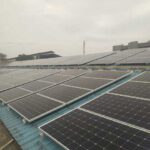India Solar Energy Policies: Key Updates and Government Initiatives
India Solar Energy Policies: Key Updates and Government Initiatives
India is one of the leading countries in terms of solar energy development, having become the fastest-growing market for solar power globally. India’s solar energy capacity has more than quadrupled in the past five years, increasing from 13,114 MW in 2017 to 57,705 MW in 2022.
India has an ambitious target to achieve Net Zero Emissions by 2070, in addition to attaining the short-term targets which include, Increasing renewables capacity to 500 GW by 2030.
To meet this goal, the government has introduced several policy initiatives and incentives such as increased financing, state initiatives, and tax benefits. These policies have helped to reduce the costs associated with solar energy projects, making them more attractive investments for both domestic and international investors. Furthermore, India’s strong technical know-how and its extensive infrastructure has enabled it to set new standards in solar energy production. As a result of these efforts, India is now a major exporter of solar energy, with most of its exports going to neighboring countries such as Bangladesh, Nepal and Sri Lanka.
Benefits of solar energy for India
1. Increased energy independence
Solar energy provides India with a source of renewable energy that can be used to reduce its dependence on fossil fuels and other imported resources.
2. Cost savings
Installing solar technology is becoming increasingly cost competitive in India with the decreasing prices of photovoltaic (PV) modules and other components.
3. Job creation
Solar energy projects in India are creating thousands of jobs, ranging from manufacturing to installation and maintenance.
4. Cleaner environment
By replacing traditional sources of power with solar energy, India can reduce its carbon emissions and help address climate change.
5. Improved access to electricity
Solar energy projects in rural areas are helping to fill the gap in access to electricity, providing clean and reliable power for people who don’t have access to traditional grids.
The government has introduced several policy initiatives and incentives that have helped to reduce costs, encourage adoption and attract investors towards solar energy.
Suggested Articles

6 Innovative Applications of Solar Energy You Should Know About
Explore how solar energy is revolutionizing daily life and industries. From solar-powered transport to smart cities, discover six groundbreaking solar applications shaping a cleaner, smarter future.
Researchers Propose New Way to Make Nuclear Power Plants Safer
Researchers propose innovative methods to enhance the safety of nuclear power plants, aiming to reduce risks and improve operational security.

Yes, I Have Installed an Optimized Solar PV Rooftop System at My Premises
A solar power generating system converts sunlight into electricity for residential, industrial, and commercial use. This blog explains the components, working, and benefits of solar systems, helping you understand how to harness solar energy efficiently and sustainably.

Case Study: Successful Design, Installation, and Commissioning of a 50 kWp Rooftop Solar PV Plant
This case study details our experience in designing, installing, and commissioning a 50 kWp solar PV rooftop power plant. Learn how we overcame technical challenges, optimized system performance, and delivered clean, reliable energy. Discover insights on panel selection, inverter sizing, monitoring, and commissioning processes that ensured maximum efficiency and long-term performance for the rooftop solar installation.

Selecting Solar Panels: Best Guide for Homes and Factories
Solar panels are a hot topic these days, as the cost of solar is finally approaching what the average family can afford.

Rooftop Solar for Factories: Maximum kW You Can Install
Industrial rooftop solar guide: Understand KW capacity limits, installation guidelines, and best practices for factories and manufacturing units

Delhi Jal Board Solar Project: A Step Towards Sustainable Energy
Delhi Jal Board has embraced solar power, becoming a leader in renewable energy adoption. This initiative highlights the benefits of solar energy, including cost savings, sustainability, and promoting clean energy practices in institutional operations.

Go Off-Grid with Solar Energy: A Complete Guide
Living off-grid, more commonly defined as not having a dependence on public utilities such as electricity, sounds appealing for a lot of reasons. The idea of being self-sufficient, powering your own home with solar energy, and maybe even building that home with your own two hands can sound like a dream and a challenge for people who wish to live life on their terms.